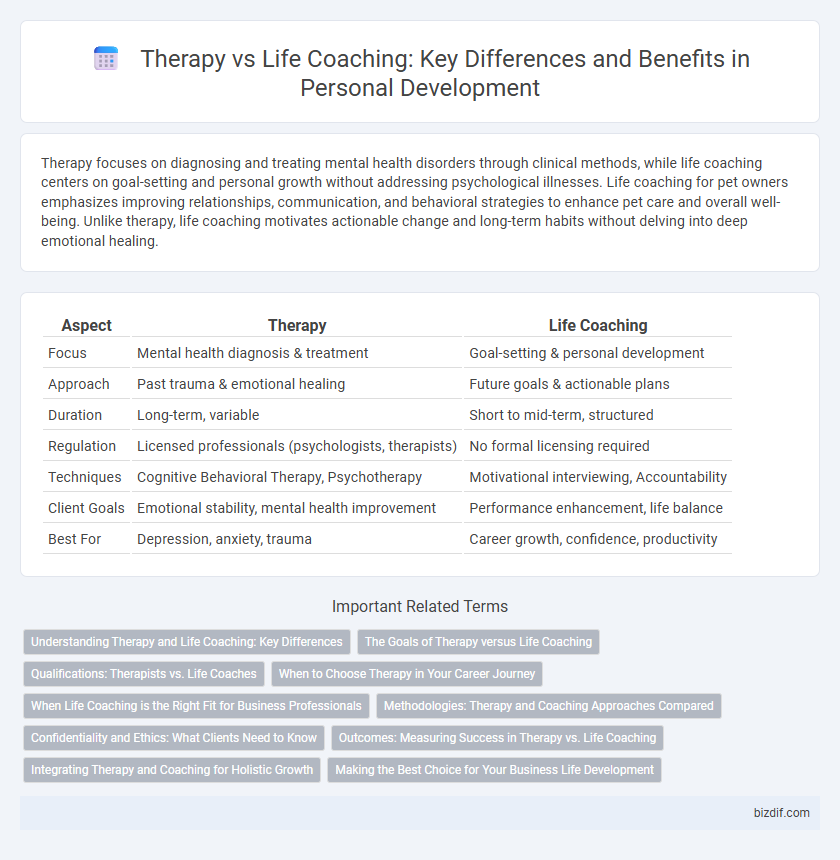Therapy focuses on diagnosing and treating mental health disorders through clinical methods, while life coaching centers on goal-setting and personal growth without addressing psychological illnesses. Life coaching for pet owners emphasizes improving relationships, communication, and behavioral strategies to enhance pet care and overall well-being. Unlike therapy, life coaching motivates actionable change and long-term habits without delving into deep emotional healing.
Table of Comparison
| Aspect | Therapy | Life Coaching |
|---|---|---|
| Focus | Mental health diagnosis & treatment | Goal-setting & personal development |
| Approach | Past trauma & emotional healing | Future goals & actionable plans |
| Duration | Long-term, variable | Short to mid-term, structured |
| Regulation | Licensed professionals (psychologists, therapists) | No formal licensing required |
| Techniques | Cognitive Behavioral Therapy, Psychotherapy | Motivational interviewing, Accountability |
| Client Goals | Emotional stability, mental health improvement | Performance enhancement, life balance |
| Best For | Depression, anxiety, trauma | Career growth, confidence, productivity |
Understanding Therapy and Life Coaching: Key Differences
Therapy focuses on diagnosing and treating mental health disorders through evidence-based techniques, addressing past trauma and emotional healing. Life coaching emphasizes goal-setting, personal development, and future-oriented strategies to enhance performance and fulfillment. Understanding these differences helps individuals choose the right support based on their needs for emotional recovery or achievement optimization.
The Goals of Therapy versus Life Coaching
Therapy focuses on healing past traumas and addressing mental health challenges to foster emotional well-being and psychological resilience. Life coaching centers on setting actionable goals, enhancing personal development, and maximizing future potential by creating strategic plans for success. While therapy delves into understanding and resolving underlying issues, life coaching emphasizes motivation, accountability, and achieving specific life or career objectives.
Qualifications: Therapists vs. Life Coaches
Therapists typically hold advanced degrees such as a Master's or Doctorate in psychology, counseling, or social work, requiring state licensure and adherence to strict ethical guidelines. Life coaches, by contrast, often acquire certification through specialized training programs but do not require formal licensure or advanced academic degrees. The difference in qualifications reflects distinct professional scopes: therapists address mental health disorders, while life coaches focus on goal-setting and personal development.
When to Choose Therapy in Your Career Journey
Choosing therapy during your career journey is crucial when dealing with deep-rooted emotional issues, trauma, or mental health disorders that impede professional growth. Therapy provides a structured environment for healing and self-awareness, enabling individuals to overcome psychological barriers that life coaching alone cannot address. When career challenges stem from anxiety, depression, or unresolved personal conflicts, therapy offers essential tools for long-term well-being and effective decision-making.
When Life Coaching is the Right Fit for Business Professionals
Life coaching is ideal for business professionals seeking goal-oriented support to enhance career development, improve leadership skills, and boost productivity. It focuses on actionable strategies, mindset shifts, and accountability to unlock potential and achieve specific professional objectives. Unlike therapy, life coaching emphasizes future goals rather than exploring past traumas or deep psychological issues.
Methodologies: Therapy and Coaching Approaches Compared
Therapy typically employs evidence-based psychological techniques such as cognitive-behavioral therapy (CBT), psychodynamic approaches, and trauma-informed care to address mental health disorders and emotional healing. Life coaching utilizes goal-oriented strategies including motivational interviewing, solution-focused techniques, and neuroscience-based practices designed to enhance personal development, performance, and future planning. While therapy often explores past experiences to heal and resolve psychological issues, life coaching concentrates on present challenges and actionable steps to achieve specific life or career goals.
Confidentiality and Ethics: What Clients Need to Know
Life coaching maintains a strong commitment to confidentiality, but its ethical standards differ from those of therapy, which is regulated by licensing boards and bound by strict legal requirements to protect client privacy. Therapists must adhere to professional codes such as the American Psychological Association's Ethics Code, ensuring client confidentiality with potential legal obligations for reporting in cases of harm. Clients should understand that life coaching offers guidance and goal-setting support without the same rigorous ethical oversight or mandated confidentiality protections provided in therapeutic settings.
Outcomes: Measuring Success in Therapy vs. Life Coaching
Measuring success in therapy often involves assessing symptom reduction, improved mental health, and emotional healing, while life coaching focuses on goal achievement, personal growth, and enhanced performance in various life domains. Therapeutic outcomes are typically evaluated through clinical assessments and patient self-reports, whereas life coaching success is tracked by progress metrics, goal completion rates, and client satisfaction. Understanding these differing outcome measures helps individuals choose the most appropriate support for their specific needs and desired results.
Integrating Therapy and Coaching for Holistic Growth
Integrating therapy and life coaching fosters holistic growth by addressing both emotional healing and goal-oriented progress simultaneously. Therapy provides deep psychological insight and trauma resolution, while life coaching emphasizes actionable strategies and future-focused development. This combined approach enhances mental well-being and empowers individuals to achieve sustained personal and professional transformation.
Making the Best Choice for Your Business Life Development
Therapy addresses mental health issues by exploring past traumas and emotional healing, while life coaching focuses on goal-setting, motivation, and actionable strategies for business growth and personal development. Choosing life coaching over therapy can accelerate entrepreneurial success by enhancing clarity, confidence, and accountability tailored to business objectives. Assess your specific needs, whether emotional support or performance improvement, to make the best choice for sustainable business life development.
Therapy vs Life coaching Infographic

 bizdif.com
bizdif.com